- Home
- Kay Hooper
Larger Than Life Page 2
Larger Than Life Read online
Page 2
So rather than wasting energy in being irritated, he thought carefully instead. He thought about where Saber and her manager would likely go for a late dinner. Then he turned on his heel and hurried toward the stage door.
As he’d expected, his subject returned to her hotel to dine, where the late night quiet and relative dimness of the restaurant lessened the odds of her being recognized. Watching them from across the room as he finished his own meal, Travis noted that she’d changed into slacks and a silk blouse but had not chosen to sport sunglasses, a hat, or any of the other traditional—and usually ridiculous—trappings of disguise.
His chance came when the pair he watched had reached the coffee stage of their meal and Saunders left the table with an audible request to his client to please get some rest before her morning flight. Grabbing his opportunity, Travis rose quickly and crossed to her table, where she was going over sheet music.
“May I join you?” he asked, sliding into a chair.
She gazed at him for a long moment, a look of irony in her silver-gray eyes. “Oh, please do,” she invited gently.
“I hate rudeness in strangers, don’t you?” he said conversationally.
“It’s trying,” she agreed.
“And it’s so hard to get rid of the determined ones, I find.”
She sighed. “Mr. Foxx—”
“Travis, please.”
Giving him another of those direct, ironic looks, she sighed again. “Travis, you have what I can see is a well-deserved reputation for tenacity. I can admire that. In fact, I’m that way myself. But to even the most tenacious eventually comes something that’s … out of reach.”
“In your experience?” he inquired politely.
“A truth of life, let’s say.”
“Saber—You don’t mind if I call you that, do you?”
“Strangers do,” she murmured.
He couldn’t help but smile at her left-handed acceptance. “Saber, I adhere to another truth of life.”
“I’m going to hate myself for asking, but what’s that?”
“‘He can who believes he can.’ I learned that at my father’s knee.”
Saber sat back, smiling a little. “From what I’ve read, your father nearly invented that philosophy. He was a self-made man, wasn’t he? Built a knowledge of electronics into a world-renowned firm?”
“He did indeed.”
“You chose not to follow in his footsteps?”
“I prefer writing. My brother runs the firm.”
“I didn’t realize you had a brother. Other siblings?”
“Two sisters …”
Later, Travis realized with something between shock and amusement that he’d allowed himself to become the interviewee rather than the interviewer. And the amusement in those silvery eyes revealed that she had deliberately planned to turn the tables on him. She now knew far more about his life and past than he knew about hers.
“Very good,” he noted dryly with a small salute.
“Thank you.”
“I don’t suppose you’d consider a fair trade of information?”
“I don’t think so.”
Travis’s hunting instincts were now fully roused. He studied her keenly across the table. “Mind if I make a few guesses?”
“Go right ahead.”
He sat back, mentally processing what very few observations and impressions he’d been able to acquire. “And just out of a sense of fair play, you understand, would you correct me if I go too far off base?” He was banking on her lack of concern over what he might guess, trusting in the inevitable human leaning toward complacency.
After a moment, she nodded slowly. “All right, Travis. If any of your guesses is glaringly wrong, I’ll point that out.”
Mere recognition of wrongness rather than correction was not quite what he’d hoped for, but he settled for it. Gathering his thoughts, he began.
“Saber Duncan is not the name you were born with. You’ve led—up until two years ago, at any rate—a very sheltered life. You’re very well educated, partly outside this country, I think. And two years ago, shortly after you cut your first two records, something happened to you, something that changed your voice, your style … even your life. Right so far?”
She was smiling faintly. “Not glaringly wrong.”
He took a deep breath and began calling forth more personal observations and perceptions. “I don’t know what happened to you during those missing months, Saber, but I’m sure it was devastating in some way. Because the lovely, fragile hot-house flower with the sweet, passionless voice became something—someone—far more complicated. I think you walked through fire.”
There was something now behind the serenity of her eyes, a glimpse of that part of her she kept caged offstage. But she was still smiling. “‘I am ashes where once I was fire’?” she murmured.
He shook his head, staring into her eyes as he tried to find and catch that elusive wildness behind the silvery curtain. “No. You’re fire now … where once you were something cool and dry.”
“And that’s what interests you, isn’t it?” Abruptly, she was distant, matter-of-fact. “What happened to the girl who became a woman? What happened to a hothouse flower to make it grow in the harsh outdoors? That’s why you’re hell-bent to write a book about me. Not because of who and what I’ve become, but because you don’t know how that happened, and you hate unsolved mysteries.”
Travis gazed at her for a long moment. He could hardly deny the quiet accusation, because it was true. But he realized now that the man was as intrigued by her as the writer. “Will you answer one question honestly?” he asked at last.
“I’ll have to hear it first.”
He nodded, expecting nothing else. “Are you the Saber Duncan who recorded two records two years ago?”
“Yes.”
“If you’d answered no,” he said quietly, “I would have lost the desire to write about you. Because you’re quite right: what fascinates me isn’t that you’re a ‘star’ or even that now you have the most incredible voice I’ve ever heard. It’s that two years ago you were a girl with a sweet, bland voice, and now you’re a woman whose larger-than-life stage presence is matched by something I sense in you offstage. Something equally larger than life.”
“That’s honest, anyway.” Her voice was curiously husky.
He leaned forward intently. “I write about people, Saber. Fictional characters or factual lives—but always people. What motivates them, what drives them. How they’ve become what they are. In a way, it’s like that song of yours. There are so few larger-than-life people, so few heroes and heroines. I write about the people who become heroic.”
“I’m not heroic.”
“One of the definitions of heroic is larger than life.” he said softly. “And you are that, Saber.”
She shook her head, denying the words or any reference to herself in them.
After a moment, he said, “I can promise that you will have final approval of the manuscript. I won’t allow anything to get into print that you don’t want in print.”
“Then you’d have no book,” she said quietly. “Because what I don’t want in print … is most of my life.”
TWO
THE SILENCE STRETCHED between them for long moments. Then Travis spoke slowly and thoughtfully.
“The past—anyone’s past—is important only in that it shaped the present. Can you accept that I need to know about your past in order to understand your present?”
“I certainly can. I just can’t accept the necessity of seeing my past in print.”
“It doesn’t have to be seen in print. As long as I understand what’s gone before, I can put the present into perspective.”
“No. Not my present.”
“Because without your past, there isn’t a present?”
She smiled slightly and gently shook her head. “Travis, try to understand how I feel about this. Certain … events in my life over which I had little or no control shape
d me into who and what I am. We could get into a long discussion over the importance of pasts, but right now, in this moment of my present, I’m very tired. And my past doesn’t seem important to me, much less to the world.”
“You avoided answering my question,” he said softly.
She sighed. “I suppose I did. I’m not quite up to your weight tonight, I’m afraid. So I think I’d better go up to my room; I have an early plane tomorrow.”
He rose to his feet as she did. “I’m not giving up.”
“I wonder why that doesn’t surprise me,” she said dryly.
It wasn’t difficult to discover what Saber’s travel plans were—not, at least, for a man experienced in unearthing information. In fact, by ten the next morning, Travis knew that Saber’s band members were on a commercial flight to Detroit, her manager on one to Los Angeles. He knew that Saunders was cutting short his participation in the tour with two performances left to go because of business appointments in L.A. And he knew that Saber would fly to Detroit in a small private jet.
It was a bit more difficult to get himself aboard that jet before she arrived, but he managed, conscious of his own wry amusement at what he was doing. He had realized during the night that his interest in Saber was no longer purely literary, but he was more than a little surprised to discover that his growing fascination was almost wholly due to her eyes. Or, more correct, what shone in her eyes. Beneath the silver-gray serenity of her gaze lay something else, something that had reminded Travis irresistibly of a wild thing crouched in waiting behind iron bars. There were secrets imprisoned behind those cool, serene eyes, secrets and a powerful but elusive part of her that Travis suspected had been born during the year of her disappearance. He was positive that the published accounts of her life up until she’d begun singing were wholly fictional, but of that missing year not even a fictional report had been given. Saber the performer had ceased to exist; Saber the woman, he felt intuitively, had walked through some kind of metaphorical fire.
He meant to find out exactly what had happened. And he was bemused to discover that his professional interest in that question had become very personal indeed.
He shelved that thought for the time being as he slipped aboard the jet and hid himself in the tiny bathroom. His patient wait consumed three-quarters of an hour before he heard Saber’s low, cheerful voice speaking to someone else. He listened to the noises of the jet’s engines and of the door being closed. The jet taxied for a bit, paused, then taxied again before increasing speed and lifting from the runway.
Travis waited until the aircraft had leveled off before he quit his hiding place. Out in the cabin, however, he experienced a considerable shock. It was empty. No Saber. No anybody else. If she wasn’t here … Frowning, he gazed toward the closed door leading to the cockpit.
When he opened the door and squeezed his way inside, he found Saber Duncan alone and at the controls.
She swung her head around to stare up at him, surprise widening the silvery eyes. “What’re you doing here?” she asked.
“I think it’s called stowing away.” Gingerly, he took the copilot’s seat, careful to touch nothing. “And I’d appreciate it if you kept both eyes on the road.”
Saber turned her attention forward again and, to his surprise, laughed quietly. “Well, I’ll say this for you: you don’t give up easily.”
Travis studied her for a long moment. Gone was the sequined, explosively powerful performer of the night before. Gone was the soft-spoken and somewhat weary lady of the silk blouse and veiled eyes. This lady was casually dressed in jeans and a workshirt open over a cowl-neck sweater, her tiny feet encased in scuffed western boots. The only jewelry she wore was a broad, masculine watch on her left wrist, and her delicate golden face was bare of any makeup.
She looked amazingly small, incredibly young, and as frail as the hothouse flower he’d compared the earlier Saber to. Yet there was something about her, something he sensed more than saw.
“You’ll know me if we ever meet again,” she said dryly.
Travis blinked and forced his mind away from the speculation. “Sorry. It’s just that … you seem so different.”
She obviously had no trouble following his vague comment. “From the stage performance, you mean? That’s because I am different. Every performer has two sides, one for the stage and one for the personal life. We can’t be ‘on’ all the time, you know.”
He frowned a little, listening to the soft, educated voice, the crisp, clean tone. “I know that. But you aren’t … ‘off’ now. You’re just different.”
Her light eyes moved ceaselessly over the instrument panels and her small hands gripped the controls a little too firmly. “Does it matter?”
Travis noted the signs of tension and made a surprising discovery. “You’re afraid of something, aren’t you?”
She threw him one startled look and then returned her attention to the controls, making an odd little grimace. “Very perceptive of you. And since,” she added wryly, “I’m not particularly concerned with the nerves of my stowaway, I’ll confess that what I’m afraid of, Travis, is flying.”
“You’re afraid of flying?”
“That’s right. Almost a phobia, in fact.”
“Then what the hell are you doing flying this jet?” he demanded incredulously.
“A very wise man told me once that a person should always try to control fear. And since the only way I can control my fear of flying is by doing the thing myself, that’s what I do. I am a licensed pilot. I learned to fly years ago. I’m fairly new to jets, though.”
“Great.” But in spite of his doubtful tone, Travis was impressed by her method of handling fear. It told him a great deal about her personality; she was one who would always confront a problem head-on and set about solving it. And his silent observation was proven when she took her present problem by the horns.
“I told you I didn’t want a book written about me, Travis. I haven’t changed my mind.”
“And I haven’t given up.”
“Obviously.”
“All I’m asking,” he said with persuasive charm, “is a chance to get to know you, Saber. No probing questions, I promise. I just want to get better acquainted with a very beautiful and talented woman.”
“D’you generally get results with that line?”
So much for my vaunted charm, he thought, not without a trace of self-mockery. “Sorry,” he muttered. “I didn’t mean to try, uh—”
“You have a very effective voice,” she observed. “Just the right blend of coolness and charm. I’m not surprised your exposés are so penetrating; it would be very easy for your victim to forget that you’re always after some little tidbit of information.”
He stiffened, then relaxed suddenly. “But not this victim?” he drawled.
She was smiling, though still not looking at him. “No, not this one. You can save your subtly probing tactics, Travis, for your next exposé. My life is my business. I accept that my profession puts me in the public eye, but I see no need of sharing my life before I stepped onstage. You go ahead and write an unauthorized version of my life,” she added imperturbably.
“And what’ll you do if I uncover the real story of your life?”
“You won’t.”
“You’re so sure?”
“Quite sure. I’m not throwing down the gauntlet, you understand; I’m simply stating a fact. You won’t find out anything I don’t want you to know.”
After a moment, Travis said softly, “That kind of cover-up demands money.”
She was mildly surprised. “Did I mention a cover-up?”
“That’s what it amounts to.”
“Not at all. You just won’t know where to look, that’s all.”
“I know where I’ll start.”
“Oh? Where?”
“With the lady herself.”
“In case you’ve forgotten,” she said politely, “I happen to be on rather a tight schedule. A performance in Detroit tonigh
t, then one in Chicago tomorrow night.”
“Then a vacation.”
Saber threw him one quick glance, annoyance warring with reluctant amusement in her light eyes. “So you know that, do you? Phil must have let that slip.”
“Yes. To do him justice, I don’t think he realized just how determined I am.”
“Well, be that as it may, the information won’t help you.”
“Really? I find most information useful—eventually.”
She was quiet for a long moment. Then, in a curiously dry voice, she said, “Short of pushing you out, I can’t stop you from coming to Detroit. And though I’ll take good care you don’t board this jet again, I can’t stop you from taking a commercial plane to Chicago. But from that point, Mr. Foxx, you’ll be at a standstill. My flight plan will be filed, of course, but—for security reasons, you understand—you won’t be able to find out where I’ve gone. If you’re a betting man, bet on that.”
Travis was well aware of the dangers of arguing with a woman who literally held his life in her hands, but the cool and certain strength of her voice intrigued him past the point of worrying about it. He gazed forward for several minutes, his keen mind working. The struggle he had with himself was brief, then his idea for the book was cast into the limbo of things unremembered and unregretted.
“I am a betting man,” he said finally. “In fact, I’m a bit of a gambler, and when I want something badly enough, I’m quite prepared to pay the price.”
“And so?” She sent him a curious glance.
“And so … I’ll make a deal with you, Miss Duncan.”
“I’ve a feeling I’m going to regret this—but what kind of deal?”
“Something for something. You agree to allow me to accompany you until, say, midway through your vacation. In the interests of our getting to know each other, you understand.”
Noncommittally, she said, “And your part of the deal?”
“I’ll agree—in writing if you like—to write nothing about you. No book, no article … nothing at all.”
Saber was frowning. “There’s a hook in there somewhere,” she said.

 A Deadly Web
A Deadly Web Raven on the Wing
Raven on the Wing Always a Thief
Always a Thief Star-Crossed Lovers
Star-Crossed Lovers Blood Dreams
Blood Dreams Shades of Gray
Shades of Gray Rebel Waltz
Rebel Waltz Chill of Fear
Chill of Fear Sleeping With Fear
Sleeping With Fear After Caroline
After Caroline Time After Time
Time After Time Haunting Rachel
Haunting Rachel Hunting Fear
Hunting Fear Out of the Shadows
Out of the Shadows Whisper of Evil
Whisper of Evil Blood Sins
Blood Sins Hiding in the Shadows
Hiding in the Shadows C.J.'s Fate C.J.'s Fate C.J.'s Fate
C.J.'s Fate C.J.'s Fate C.J.'s Fate Fear the Dark
Fear the Dark Illegal Possession
Illegal Possession Stealing Shadows
Stealing Shadows If There Be Dragons
If There Be Dragons Once a Thief
Once a Thief In Serena's Web
In Serena's Web On Wings of Magic on Wings of Magic
On Wings of Magic on Wings of Magic Hostage
Hostage The First Prophet
The First Prophet Through the Looking Glass
Through the Looking Glass Golden Flames
Golden Flames Finding Laura
Finding Laura Haven
Haven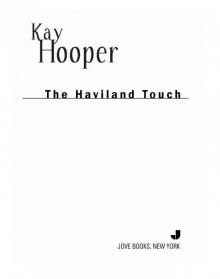 The Haviland Touch
The Haviland Touch The Lady and the Lion
The Lady and the Lion Haunted
Haunted Velvet Ligntning
Velvet Ligntning Blood Ties
Blood Ties Adelaide, the Enchantress
Adelaide, the Enchantress The Matchmaker
The Matchmaker Golden Threads
Golden Threads The Haunting of Josie
The Haunting of Josie Rafferty's Wife
Rafferty's Wife Amanda
Amanda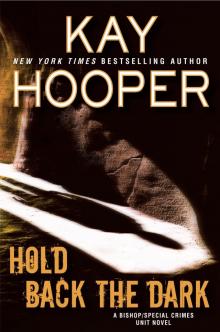 Hold Back the Dark
Hold Back the Dark Sense of Evil
Sense of Evil What Dreams May Come
What Dreams May Come Larger Than Life
Larger Than Life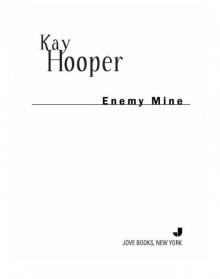 Enemy Mine
Enemy Mine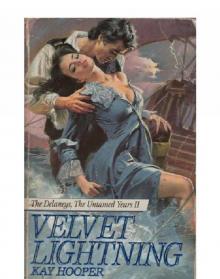 Velvet Lightning
Velvet Lightning The Fall of Lucas Kendrick
The Fall of Lucas Kendrick Aces High
Aces High Captain's Paradise: A Novel
Captain's Paradise: A Novel The Wizard of Seattle
The Wizard of Seattle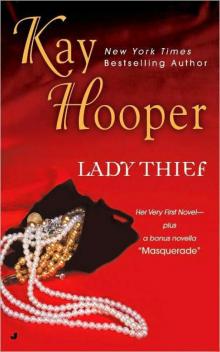 Lady Thief
Lady Thief Summer of the Unicorn
Summer of the Unicorn Outlaw Derek
Outlaw Derek Wait for Dark
Wait for Dark The Glass Shoe
The Glass Shoe It Takes a Thief
It Takes a Thief Zach's Law
Zach's Law Unmasking Kelsey
Unmasking Kelsey Hidden Salem
Hidden Salem